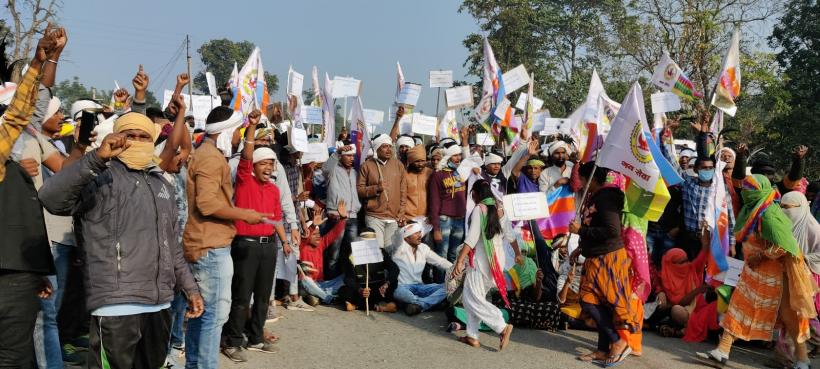‘The community here does not have any hatred towards a particular religion. But the question is how is the government blatantly cracking down on our indigenous culture and practices to erase what we know.’Sumedha Pal 18 Dec 2020
Marking two years of forming the government in Chhattisgarh, the state government is embarking on an ambitious project – the construction of an over 1,000 km long Ram Van Gaman Path, the route taken by the Hindu deity Lord Ram while on his way to exile, according to the Ramayana.
The government organised a mega rally, which began on December 14 and spanned 17 districts. It was a symbolic march to collect soil from the region for the path which is to be constructed.
Chhattisgarh houses a significant percentage of India’s tribal communities – a little over 30%. Particularly vulnerable tribes like the Kols, Gonds, Bhunjias and Bhaiyanas, many of whom worship forests, mountains and natural deities, have been resisting being brought into the Hindu fold.
IMPOSITION OF HINDUISM, ERASURE OF TRIBAL IDENTITY
As the government decides on 51 sites to promote temple construction and tourism, the Adivasi agitation against the imposition of Hinduism has intensified across the state. The yatra took off from Rama Rao in Sukma on December 14, where members of the tribal community protested vociferously.
In several places in Sukma and Kanker, they did not allow soil to be taken for the path. As the rally arrived in Kondagaon on December 15, members of the communities blocked roads in large numbers. According to reports, the Adivasis took out the soil that the chariot had collected earlier and said that they would not let their ancestry surrender to the Hindu fold. The yatra was scheduled to arrive in Uttar Bastar Kanker district on December 16. However, the tribals blocked NH-30 in Kalgaon, resulting in a two hour-long jam.
The state is witnessing a widespread agitation against the move, especially in its remote areas. Speaking to NewsClick, activist Soni Sori explained the concerns of the local communities. “The government wants to build this path, but the tribal community does not know anything about Lord Ram. Our question is why has the government not protected our gods, our culture our Jal, Jangal, Jameen?”
“The community here does not have any hatred towards a particular religion. But the question is how is the government blatantly cracking down on our indigenous culture and practices to erase what we know. When tribals gather at night to worship or when they hunt, they are beaten up; hunting is also a tribal practice which has been criminalised for a long time, so many people are languishing in jails, because of hunting,” she said.
The rally comes at a time where there is an active campaign in the state by right-wing groups to convert members of tribal communities to the Hindutva fold as well as to attack the marginalised communities. The spate of attacks on the Christian community in the state have increased, with the community saying that local members of the Bharatiya Janata Party and the Vishwa Hindu Parishad have been organising a campaign to forcefully convert Christians, particularly Adivasi Christians in the district, to Hinduism.
Earlier in the year, Chief Minister Bhupesh Singh Baghel laid the foundation stone for expansion of an ancient temple of Mata Kaushalya, considered the mother of Ram, in Raipur.
Speaking to NewsClick, Dikri Chauhan, a member of the People’s Union for Civil liberties (PUCL) said: “With the change in the government it was hoped that the Congress will not side with majoritarianism. However, the active interest to promote Hindutva makes the Congress and the BJP alike. There are examples of Ramayanas distributed in the Gundi region and spreading of religious messaging in a bid to convert tribals who do not see themselves as so to become part of the Hindu fold,” she said.
Amid a growing effort by the BJP and its ideological parent, the Rashtriya Swayamsevak Sangh (RSS), to stall religious conversions, tribals across India are reasserting their demand to remain outside the Hindu fold.
Adivasi leaders in the state of Jharkhand, and now across the country, have been demanding the implementation of Sarna code in census surveys, which would allow the tribals to be identified as followers of Sarna faith during the 2021 Census. Until now, the census surveys have included them as “others” in the religion column. The RSS interprets all who fall in the “others” category as belonging to the Hindu faith.
Over the years, the saffron party has pushed the narrative that Adivasis are Hindus “by nature”.
courtesy Newsclick

Leave a Reply